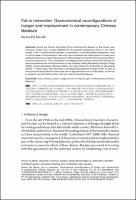Chapter Eat to remember. Gastronomical reconfigurations of hunger and imprisonment in contemporary Chinese literature
| dc.contributor.author | De Marchi, Serena | |
| dc.date.accessioned | 2022-06-01T12:24:03Z | |
| dc.date.available | 2022-06-01T12:24:03Z | |
| dc.date.issued | 2021 | |
| dc.identifier | ONIX_20220601_9788855185066_615 | |
| dc.identifier.issn | 2704-5919 | |
| dc.identifier.uri | https://library.oapen.org/handle/20.500.12657/56430 | |
| dc.description.abstract | During the famine that befell China following the disaster of the Great Leap Forward, hunger was a major affliction for the individuals undergoing reform in the labor camps. Food – in terms of procurement, consumption, or just discursive recollection – was a central issue in the prisoners’ lives and, as a consequence, descriptions of meals and eating practices are a recurring presence in modern Chinese literary texts that revolve around carceral experiences. This contribution investigates three literary works that reconstruct personal experiences of imprisonment by way of eating: Wang Ruowang’s Hunger Trilogy (1980), Zhang Xianliang’s Mimosa (1984), and Yang Xianhui’s Chronicles of Jiabiangou (2003). In these texts, food becomes a privileged perspective through which look at how personal and collective memories are re-appropriated and re-elaborated, as well as to analyze how narratives of the past are consumed and produced. | |
| dc.language | English | |
| dc.relation.ispartofseries | Studi e saggi | |
| dc.subject.other | Food | |
| dc.subject.other | memory | |
| dc.subject.other | prison | |
| dc.subject.other | laogai | |
| dc.subject.other | prison writing | |
| dc.subject.other | hunger | |
| dc.subject.other | contemporary Chinese literature | |
| dc.title | Chapter Eat to remember. Gastronomical reconfigurations of hunger and imprisonment in contemporary Chinese literature | |
| dc.type | chapter | |
| oapen.identifier.doi | 10.36253/978-88-5518-506-6.12 | |
| oapen.relation.isPublishedBy | bf65d21a-78e5-4ba2-983a-dbfa90962870 | |
| oapen.relation.isbn | 9788855185066 | |
| oapen.series.number | 233 | |
| oapen.pages | 16 | |
| oapen.place.publication | Florence |

